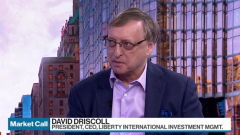Nov 10, 2023
Markets today: S&P 500 rally powers ahead to embolden bulls
, Bloomberg News
Equity strategist on retailers, industrial and auto stocks in Q3
Stocks extended their November rally amid a surge in tech giants, a relatively calm session for bonds and no major surprises from U.S. Federal Reserve speakers.
A rebound in the S&P 500’s most-influential group sent the gauge to a seven-week high. The U.S. equity benchmark broke above its key 4,400 mark and the 100-day moving average — seen as bullish developments by many chartists. The Nasdaq 100 climbed the most since May, with Microsoft Corp. hitting a record and Nvidia Corp. extending gains into an eighth straight session.
“Stocks have staged a meaningful recovery,” said Adam Turnquist, chief technical strategist for LPL Financial. “Oversold conditions, solid earnings and a sharp pullback in interest rates have been the primary drivers.” A breakout above 4,400 would “reverse the S&P 500’s current downtrend and check the box for a higher high — raising the probability that the correction lows were set last month.”
A calmer session in the Treasury market also helped push stocks higher on Friday. Ten-year yields were little changed, following a surge triggered by a weak 30-year bond sale and Jerome Powell’s “sterner” tone on policy.
Wall Street continued to keep an eye on the latest remarks from U.S. officials, with Fed Bank of Atlanta President Raphael Bostic saying policymakers can return inflation to their goal without the need to hike further. His San Francisco counterpart Mary Daly said the central bank may need to hike again if progress on inflation stalls while the economy roars ahead.
Data Friday showed consumer long-term inflation expectations hit a 12-year high, while economic concerns weighed on sentiment.
Traders should expect the Fed to highlight its commitment to the two per cent inflation target, but the rise in long-run inflation expectations indicate consumers are not convinced the Fed can fulfill its inflation mandate, according to Jeffrey Roach, chief economist for LPL Financial.
Investors have softened their emotional reactions to data in recent weeks, with significantly less volatility, and we expect the same with the possibility of a government shutdown next week if a spending deal is not struck,” according to Mark Hackett, chief of investment research at Nationwide.
“Historically, shutdowns have been short in duration and limited in economic or market impact,” he noted.
The caution that pervaded equity markets in the past three months has now switched to “year-end greed” on expectations of a decline in U.S. bond yields, according to Bank of America Corp.’s Michael Hartnett.
Global stocks recorded inflows of US$8.8 billion in the week through Nov. 8, according to the note citing EPFR Global data. Still, cash remains the asset class of choice, Hartnett said. About $77.7 billion went into money market funds in the week, setting them up for record annual inflows of $1.4 trillion.
“We see upside for equity indexes, supported by earnings growth among quality companies,” said Solita Marcelli, chief investment officer for the Americas at UBS Global Wealth Management. “Overall, we believe 2024 should be a good year for investors who put their money to work in balanced portfolios, with positive prospective returns across stocks, bonds, and alternative investments.”
Meantime, investors who piled into long dollar positions on the hopes of a hawkish Fed are rapidly selling out of one of the most-crowded trades this year, according to Bank of America strategists including Ralf Preusser and Meghan Swiber.
“USD FX overweights have been cut back dramatically, and the change in sentiment has been the most pronounced since early 2021,” they wrote.
Elsewhere, the euro edged higher after European Central Bank President Christine Lagarde said that keeping the deposit rate at four per cent should be enough to tame inflation, but officials will consider raising borrowing costs again if they need to.
Bitcoin hovered near $37,000 — the highest price in 18 months. Oil advanced, but still notched a third straight weekly drop on growing concerns over global demand and the unwinding of the Israel-Hamas war’s risk premium.
Corporate Highlights:
- T. Rowe Price Group Inc. said clients will likely withdraw more than $26.3 billion in the fourth quarter, extending a streak of redemptions by investors ditching actively managed mutual funds for cheaper products or cash money-market holdings.
- Trade Desk Inc., a digital advertising platform, gave a weak revenue forecast for the current quarter, sending a warning flare about the health of the ad market.
- Hydrogen producer Plug Power Inc. reported worse-than-expected third quarter earnings and issued a going-concern warning.
- Country Garden Holdings Co. posted its biggest sales drop in at least six years as customers’ concerns about its ability to complete projects threaten to exacerbate a cash crunch at the defaulted Chinese developer.
Stocks
- The S&P 500 rose 1.6 per cent as of 4 p.m. New York time
- The Nasdaq 100 rose 2.2 per cent
- The Dow Jones Industrial Average rose 1.2 per cent
- The MSCI World index rose 0.6 per cent
Currencies
- The Bloomberg Dollar Spot Index fell 0.2 per cent
- The euro rose 0.2 per cent to $1.0685
- The British pound was little changed at $1.2226
- The Japanese yen fell 0.1 per cent to 151.53 per dollar
Cryptocurrencies
- Bitcoin rose two per cent to $37,270.54
- Ether rose 1.4 per cent to $2,088.24
Bonds
- The yield on 10-year Treasuries was little changed at 4.62 per cent
- Germany’s 10-year yield advanced seven basis points to 2.72 per cent
- Britain’s 10-year yield advanced six basis points to 4.34 per cent
Commodities
- West Texas Intermediate crude rose two per cent to $77.25 a barrel
- Spot gold fell 1.1 per cent to $1,936.06 an ounce
This story was produced with the assistance of Bloomberg Automation.






